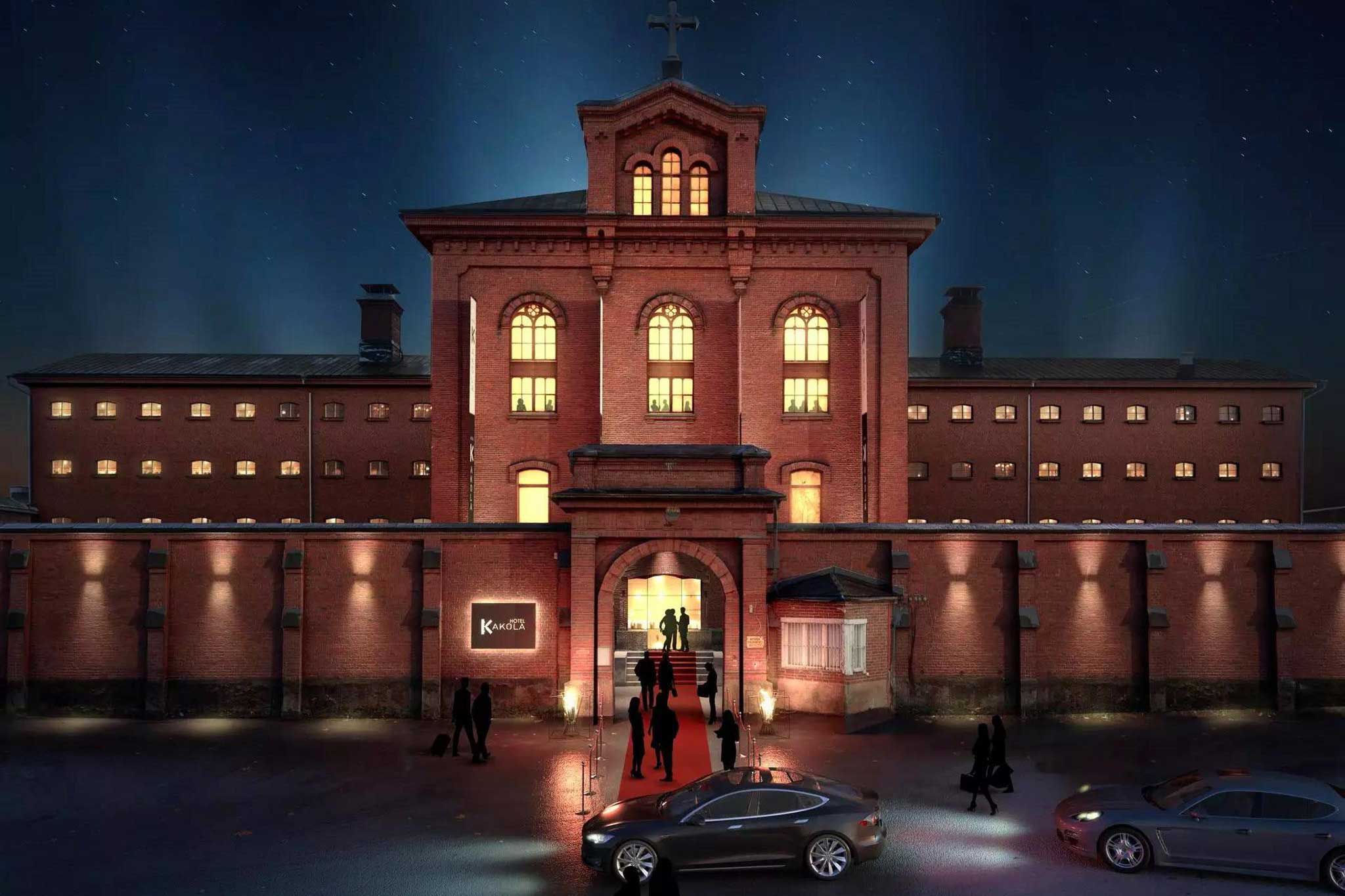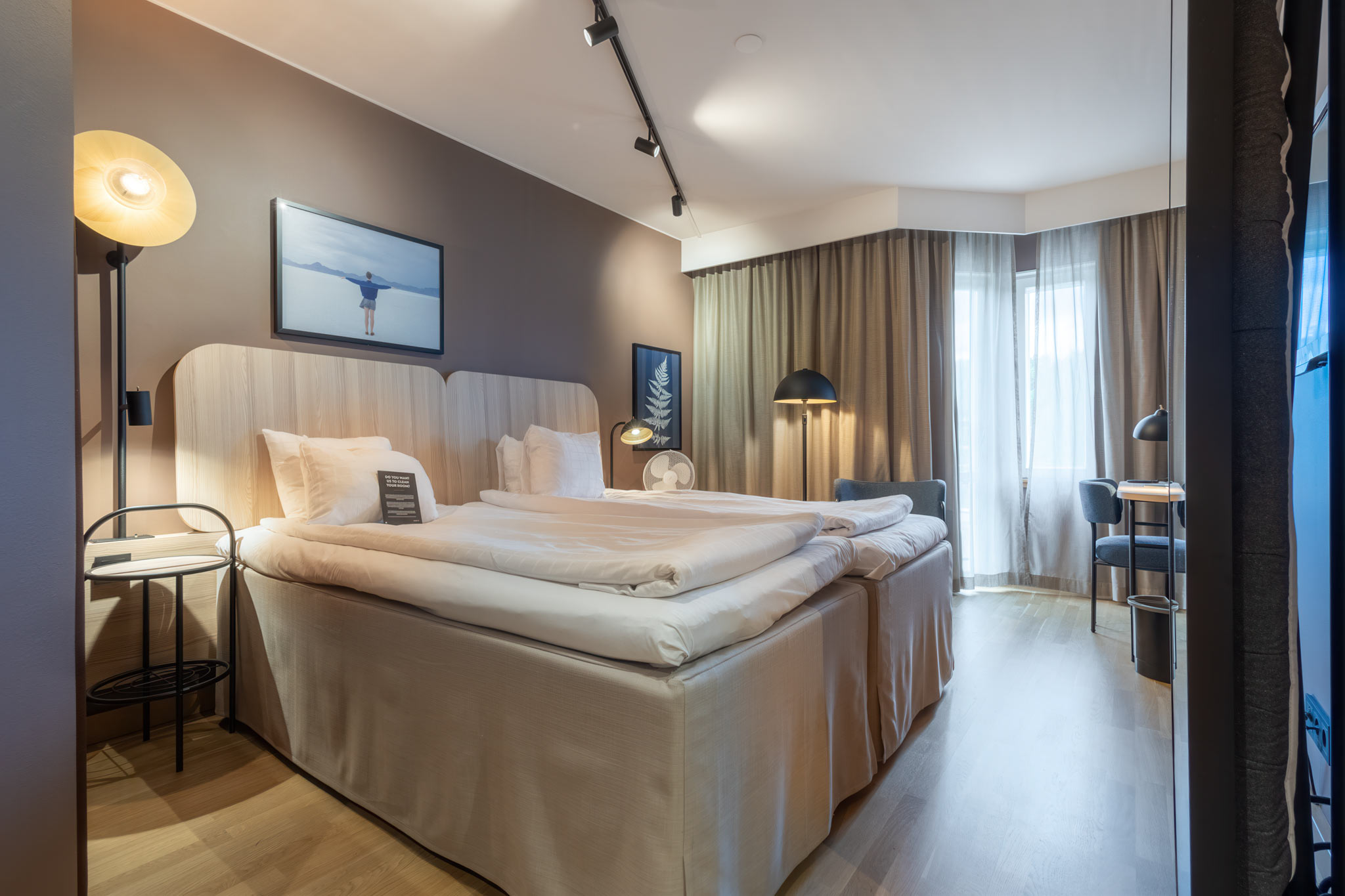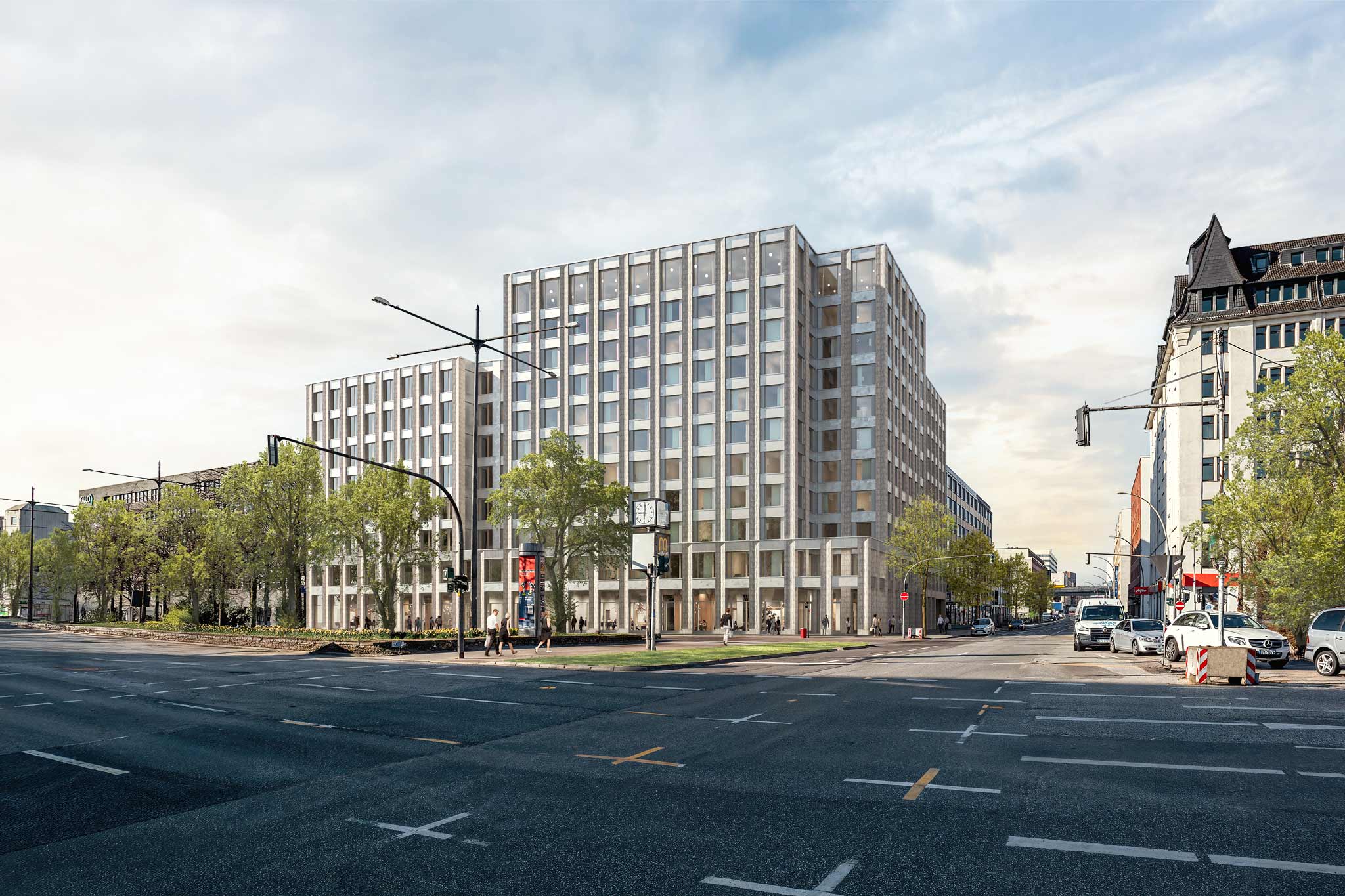The new boutique hotel on Turku’s famous Kakolanmäki Hill provides unique experiences, glimpses into the past and uncompromising elegance. More adventurous guests can even opt to spend their night in a former solitary confinement cell. Opened in Turku in September 2020, Hotel Kakola marks a new brighter chapter in the history of the county prison dating back to 1890. Up until 2007, the cross-shaped building’s cells housed prisoners on remand and other detainees, and one of the wings was sectioned off to serve as a women’s facility. The central prison next door was reserved for the country’s most notorious criminals.
“It is my hope that, after the years of infamy, the old prison complex will now be known for providing enchanting experiences and building a positive history, at least for the next couple of centuries. The walls are surely strong enough to take anything,” says General Manager Eerika Rinne with a smile.
The red-brick prison encircled by a wall stood empty for a decade before Olli and Leena Ojala’s family-owned company Kakola Yhtiöt decided to take on its renovation. At the time, the construction of housing and commercial premises in the central prison building was already under way.
The most fascinating aspect about Kakolanmäki is its exciting history. The hill, which is the second highest in Turku, was originally chosen as the prison site not only because of its location but also because of the granite it contained. The prisoners, who were put to work as stone cutters, jokingly dubbed the building stone they quarried ‘kakolite.’ Upon completion in 1853, the central prison served as an excellent deterrent as it was visible all the way from the city centre. The view from the hill is as impressive as ever, but Kakola has now evolved from intimidating to inviting.
“Kakolanmäki has become a new lively and vibrant district in Turku, which is home to roughly a thousand families. It will take a few years for the area to be fully complete, but it already hosts a slew of wonderful small businesses, including a bakery, roastery and brewery.”
Beer made from malted barley was already a popular beverage in Kakolanmäki a hundred years ago. Today, the central prison’s old kitchen is used by Kakola Brewing Company for the production of craft beers. Bageri Å, in turn, is a new milestone in Kakola’s long baking tradition as the first artisan bakery in Finland with its own stone mill. Wellness and pampering will be covered by the spa which, once complete, will bump the area’s conference guest capacity up to 850.
“Whenever major events, meetings and conferences are held in Turku, we want to be involved in offering high-quality services to all visitors,” Rinne says.
Hotel Kakola is known to appeal to travellers who seek unique destinations and experiences that are out of the ordinary. This trend is increasingly steering the choices of group and conference guests, too.
“The conference guests who visit us can tell the stories they hear in Kakola to their friends and families back home. We have no shortage of tales to tell, Rinne says, estimating that there are around two dozens hotels built in a former prison in the world.”
In addition to Hotel Kakola, Finland boasts Hotel Katajanokka in Helsinki, which was actually General Manager Rinne’s previous employer.
“First-time guests come to Kakola because of the unusual setting, but they return for the impeccable and warm service. As a family business, Hotel Kakola can flexibly meet its customers’ needs. Our only shackles hang from the wine bar ceiling.”
The prison’s historical legacy is fostered by means of inventive details in the hotel’s common areas. In addition to shackles, the hotel features bed sheet escape ropes as curtains, handcuffs within chair backrests, stripe patterns on corridor carpets and tally marks on the walls. Each floor has its own pastel colour scheme as a throwback to the prison’s old days. The colours aided the work of the guards.
“We are certainly not ashamed that the building is a former prison, but we don’t want the hotel to be a theme park that only provides one-off thrills, Rinne says, describing the difficult balancing act with the past.”
Most rooms have no prison-related references, but exciting options are available for guests who are more adventurous at heart.
“We decided to retain four isolation cells for use as accommodation. The decision was sound as the cells have drawn a great deal of interest. Families with children have been extremely fond of the family rooms where the new bunk beds were designed to resemble barred cages.”
All in all, Hotel Kakola features some 150 rooms, among the most unusual of which is the premium suite being built in a sailing boat in the hotel’s yard.
“The premium suite is being restored by the same trusted carpenter who provided the custom interior for the Ojala family’s sailing boat at the beginning of the 1990s, Rinne explains.”
Kakolanmäki has its wild and sordid history, but it has also always been known for its skilled craftsmen and women. The toys and furniture made by the prisoners were once extremely popular, and the appreciation for skilled craftsmanship is also evident in Hotel Kakola.
“We have benches and tables made by the prisoners, as well as a thousand napkins, for example,” Rinne says.
In the hotel’s construction phase, every possible component of the former prison was utilised, starting with the boards in the intermediate floor. The age-old boards now serve as partition elements in Restaurant Ruben and tables in the conference rooms and wine bar.
“The wide boards salvaged from the old intermediate floor originally came from a tree that grew in Kakolanmäki in the 18th century,” Rinne explains.
Sustainable solutions are an important part of the hotel’s values and responsibility. New products and materials, from bathroom tiles to breakfast foods, are always purchased from as close by as possible.
“Built in the former prison cafeteria, Restaurant Ruben has a simple philosophy: we offer pure, seasonal and locally sourced quality food with a regional twist.”
The summer terrace Riviera is located in the inner courtyard next to Ruben. It was named after the Kakola stone quarry’s spring, which the prisoners used to cool off on hot summer days. Ruben can hold about 150 people and the Pavillion banquet and conference hall next door can hold also about 150 people. The Pavillion can be rented separately and partitioned into group spaces and booths.
“The hotel’s atmospheric Church hall provides a wonderful setting for important life celebrations, meetings and concerts. The high windows painted by the prisoners in 1890 are a sight to remember.”
Once the prisoners were relocated from Kakolanmäki, a decision was made to keep the county prison’s church, which later became Kakola Hall. Like Kakola Attic, the banquet and meeting room can be reserved through the hotel, even though both premises are located further up the hill. The modern conference facilities on the hotel’s ground floor were named after figures in the prison’s history.
“Rooms were dedicated to Kakola’s first prison governor Sven Mustelin, prison chaplain Uuno Heikkilä, and well-known benefactor of prisoners Mathilda Wrede,” Rinne explains.
Story sessions and guided tours that delve into the prison’s history are an excellent activity for conference guests, but all other sights and activities of Turku are also right at hand.
Kakolanmäki’s location between the port and city centre is absolutely ideal. The enchanting banks of the Aura River can be accessed by a funicular, and the idyllic wooden district of Port Arthur is situated on the other side of the hill.
In the old days, the imposing walls of the county prison kept any curious visitors away, but now the gates and doors are open to everyone, locals and tourists alike.
Hotel Kakola is ready to tell its tale.



